People Of Zahedan Hold Another Round Of Anti-Regime Protests
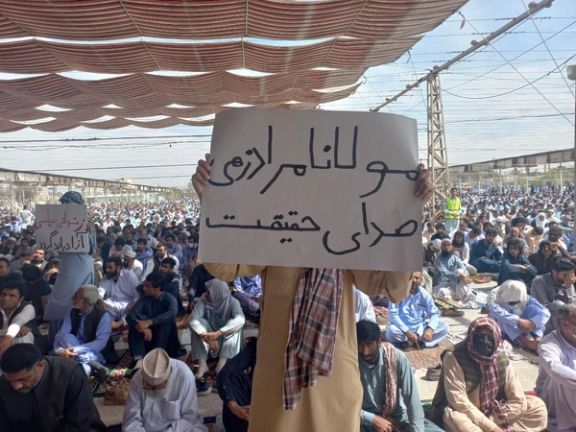
People in the southeastern city of Zahedan held protest rallies on Friday for the 23rd week in a row amid a heavy security presence, chanting anti-regime slogans.

People in the southeastern city of Zahedan held protest rallies on Friday for the 23rd week in a row amid a heavy security presence, chanting anti-regime slogans.
Following the Friday prayers and sermons by Sunni leader of the city Mowlavi Abdolhamid, people held demonstrations chanting “We don’t want a child-killing regime.”
The outspoken cleric’s sermons contained fewer disparaging remarks about the regime compared with previous weeks, but he kept criticizing the ruling power for discrimination and bloody crackdown on dissent.
He said the country is in a deadlock in domestic and foreign policies, and called for fundamental change “according to people’s demands.” “The problems will not be solved until the rights of minorities, women and youth are respected," he noted.
Abdolhamid described "national interests, security and freedom of all Iranians and justice for all throughout Iran" as the basic priorities of the country.
He also touched on the issues specific to the people of the province, such as lack of drinking water and the government not issuing identification documents for people residing there.
Forces under the command of the Revolutionary Guard have killed well over 100 people in the Baluch-populated region since September 30 when the bloodiest crackdown took place in Zahedan.
The Sunni people of the city of Galikesh in Golestan province, where there are also large Sunni Baluch communities living for decades, held gatherings in support of their Mowlavi (Imam), Mohammad-Hossein Gorgij, who has reportedly been put under house arrest.
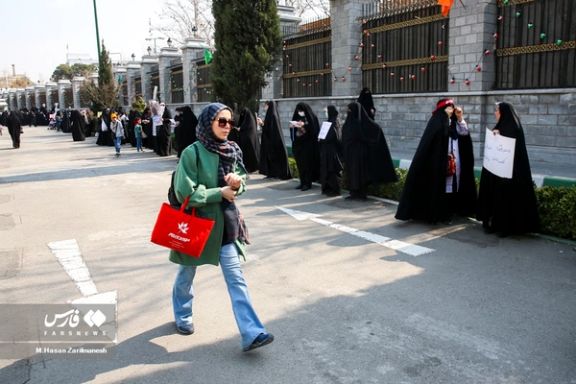
Iran's hardliners appear to be launching a new effort to enforce veiling laws more forcefully again to put a stop to women’s increasing defiance of the compulsory hijab.
At a meeting of the State Social Council Thursday, President Ebrahim Raisi described women’s abidance by veiling laws as a “sharia requirement” and said all authorities are of the same mind on this matter. “It is necessary for everyone to feel responsible, and although some people may have different opinions on this matter, in social life, adherence to legal standards should be considered as a principle".
He also claimed that the social experience of the Islamic Revolution has shown that the Iranian women themselves are adamant on keeping the veiling as a priority to ensure their safety and security in the society while also calling on all responsible entities to support those who practice ‘amr-e be marouf’, that is, calling others to enjoin what is good and forbid them from doing what is wrong.
This video shows a veiled woman taking photos of two young girls on the street and telling them the photos will be used to identify them with face recognition software.
Raisi’s very influential father-in-law, Ahmad Alamolhoda, who represents Supreme Leader Ali Khamenei in Khorasan-e Razavi Province, urged “pious” women and men not to allow the women in the Iranian society unveil. Making similar remarks about individual’s responsibility to enforce the hijab last week he had implied that the regime and its security apparatus are no longer able to take the burden of stopping those who defy the compulsory hijab.

Several videos have emerged on social media in the past few days of disputes in public over veiling between its proponents and the women who are now defiantly appearing ‘hijabless’ in public.
“You live in an Islamic society and you must abide by its law,” a veiled woman holding a baby in her lap in a city bus is seen telling another woman in a video apparently taken in Isfahan, but the ‘hijabless’ young woman who is filming the incident with her mobile phone, objects and tells her how she dresses is none of other people’s business. The veiled woman threatens her with filming her, sending it to authorities and causing her trouble in getting into university for her defiance of the hijab.
A veiled woman being thrown out of an underground car by a crowd of young girls after trying to exhort them about observance of hijab.
To enforce the veiling rules the regime has always used the so-called ‘morality police’ as well as organized groups of male and female Basij militia. It was in custody of the morality police that the 22-year-old Mahsa Amini suffered injuries that led to her death in September, fueling the longest-ever anti-regime protests in the country.
The morality police have been keeping a very low profile in the past few months but on Wednesday hardliner female lawmaker Zohre Elahian said in a tweet that Basijis held their first “verbal warning (amr-e be marouf) maneuver” in some areas of the capital.
“The devout Basijis’ act, after the recent domestic and foreign riots and seditions in the country, is unprecedented,” she tweeted with a hashtag calling on authorities for support.
A video posted Wednesday on Twitter showed a long line of black-veiled women parading on a street in Isfahan in central Iran. The post called the parade “the great and mighty maneuver of chaste Isfahani ladies.”
These “maneuvers” seem to be part of a larger initiative planned to bring anti-compulsory hijab movement under control before more women flaunt the hijab rules in the intense heat of the summer.
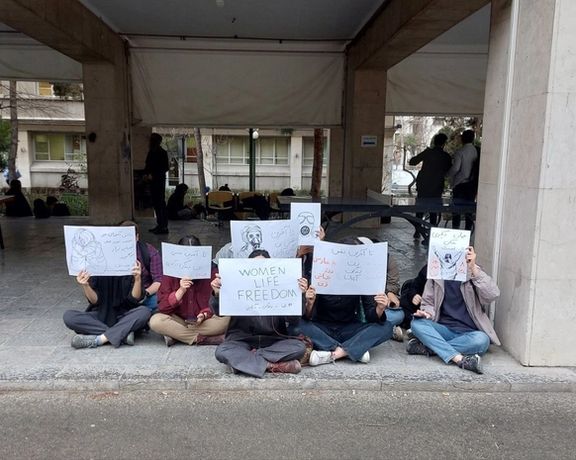
As chemical attacks continue across schools in Iran, threatening text messages from Iran's security agencies have been sent to teachers warning them from supporting protests.
Teachers and activists who organized gatherings and protests to express concern over the health of students, were also summoned by the judicial authorities.
During Tuesday's nationwide protests against the serial poisonings, the law enforcement forces violently attacked teachers and parents in different cities by firing tear gas while several were arrested.
At least 297 poisonings have been reported in girls' schools in 25 Iranian provinces since November 30when the first attack occurred in the religious city of Qom, believed to be led by regime agents in a bid to quash students' support of the 'woman, life, freedom' movement.
The chemical attacks were not limited to schools, and in the past days, female students at university dormitories have also been targeted. Nearly two thousand students have been taken to hospitals and medical centers so far.
Meanwhile, summonses and sentences for civil, political and student activists continue. In a recent case, a revolutionary court sentenced children’s rights activist Samaneh Asghari to 18 years and three months in prison, of which six years and three months can be enforced.
Samaneh Asghari, an industrial engineering student at Kharazmi University, was arrested on October 19 during a protest in Tehran.
Leila Hosseinzadeh, a political activist, and student has also tweeted that she has been summoned by the ministry of intelligence.

While the world celebrated the International Women's Day, with Iran in focus, the US bestowed the Madeleine Albright award on Iranian women.
In a ceremony hosted by First Lady Jill Biden and Secretary of State Antony Blinken at the White House on Wednesday, US Ambassador to UN Linda Thomas-Greenfield presented the inaugural Madeleine Albright Honorary Group International Women of Courage Award to the women and girls in Iran, who embarked on months of grassroots rallies following the death of Mahsa Amini, the 22-year-old Iranian woman died in ‘hijab police’ custody.
The United States also honored 11 global women leaders -- some from countries hit by crises -- to mark International Women's Day and recognize those with "exceptional courage, strength, and leadership in advocating for peace, justice, human rights, gender equity and equality, often at great personal risk and sacrifice."
Earlier in the day, US State Department Spokesperson Ned Price announced the new annual award in honor of Former Secretary of State Madeleine Albright’s legacy and her championing of women’s rights and universal rights around. “Given her longstanding support for women’s empowerment and leadership, we can’t think of someone who exemplifies the goals and values of the IWOC Award better than Former Secretary Albright,” he said, adding, “We’re proud to recognize the women and girl protestors of Iran with the inaugural Madeleine Albright Group Honorary Award this year.”
Price said that over the course of the past six months, the world has witnessed the bravery, the determination, the resilience of the protesters in Iran, so many of whom are women, noting that the leadership of this movement is in some ways dominated by women as they are at the vanguard of this movement.
“We have seen the remarkable courage of these protesters, including these women who have taken to the streets at no shortage of personal risk to themselves," he added, highlighting that “They are in prison; they’ve been harassed; they’ve been injured. In too many cases, the regime has ended their lives prematurely for doing nothing more than exercising a right that is as universal to them as it is to women and girls here in this country.”
In a statement to mark the occasion, US President Joe Biden said, “ We see it in Afghanistan, where the Taliban bars women and girls from attending school and pursuing employment. We see it in Iran, where the regime is brutally repressing the voices of women who are courageously standing up for their freedom.”
This year’s International Women's Day saw activists holding demonstrations all over the world from Jakarta and Singapore to Istanbul, Berlin, Paris, Rome, Caracas, Montevideo, and so many others with a focus on Iran, embroiled in antigovernment protests, and Afghanistan, where girls are denied the right to education.
In London, protesters marched to the Iranian embassy in costumes inspired by the novel and television series "The Handmaid's Tale", while in Valencia, Spain, women cut their hair in support of the Iranian women.
In recent days, the Islamic Republic has faced renewed global pressure amid public anger over a wave of chemical attacks on girls in dozens of schools. The regime has arrested several people it accuses of connections to the poisonings as well as to "foreign-based dissident media".
Also on Wednesday, Farhan Haq, the deputy spokesperson for the United Nations secretary-general, said the UN is following the reports about poisoning among schoolchildren and the UN Country Team has offered support to speedily and accurately ascertain the facts of this issue. "It's important for the Iranian authorities to investigate this fully and transparently, but we'll continue to monitor what's going on there,” he said.
In a tweet on Wednesday, UNESCO urged thorough investigations and immediate actions to protect schools and facilitate the return of affected students in Iran to their safe and healthy classrooms. UNESCO Director-General Audrey Azoulay expressed deep concern “about the reported poisoning of schoolgirls in Iran over the past three months,” describing the attacks as “a violation of their right to safe education.”
The UK and the US, the European Union, and Australia issued sanctions on the Islamic Republic to mark International Women's Day. The UK targeted global violators of women’s human rights, including Iran's morality enforcing outfit and its top official, while the US imposed sanctions on Iranian officials and companies over serious human rights abuses.
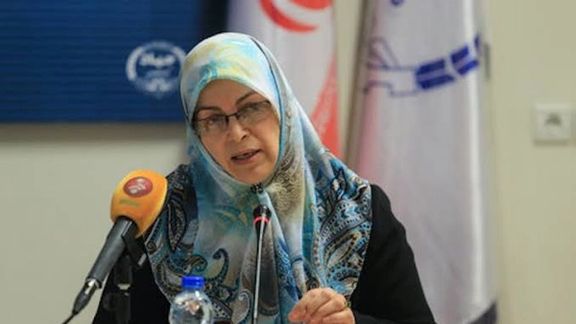
An Iranian reformist party has demanded an end to compulsory hijab and laws that legalize child marriage and discrimination against women in education and work.
In a statement to mark International Women’s Day, the Etehad-e Mellat party strongly criticized the many discriminatory laws of the Islamic Republic against women including the compulsory veiling laws and called for their abolition or change.
Etehad-e Mellat, formed in 2015, is the only major Iranian political party with a female secretary general, Azar Mansouri, who was elected by the party’s congress in December 2021. Many of the party’s members are veteran reformist politicians and activists and members of the Islamic Iranian Participation Front (Mosharekat) which was banned in 2009.
In the past few years the anti-compulsory hijab movement which took root with a social media campaign in 2017 called White Wednesdays, has hugely grown. The movement has gained greater momentum since the death in custody of the 22-year-old Mahsa Amini in September and the protests that her death sparked.
Many women now are adamant to be hijab free in public. They can be seen defiantly rejecting the head scarf everywhere, from restaurants to banks and in parks where previously, they could not even enter without a head covering.
To re-establish its control over women, authorities have resorted to threats against women again. After the video of a female pharmacist’s argument with a customer who demanded that she should wear the hijab went viral recently, authorities ordered all female pharmacists and pharmacy workers to wear maqna’e, a black veil with stitched front coming down to the chest that is much more conservative than the headscarf, and threatened to shut down the pharmacies if their staff did not comply.
Family laws give men the right to make decisions about women’s lives and Etehad-e Mellat wants to see this change. In a statement, it says that state-sponsored cultural entities and media help promote fundamentalist views and provoke the religiously-minded to restrict women’s rights and freedoms.
The party has also criticized discrimination against women in higher education as women are barred from studying certain subjects or given limited acceptance opportunities to allow more men to enrol. There is also discrimination against women when it comes to holding teaching positions in universities and higher government positions.
Etehad-e Mellat also criticized the authorities for trying to cast women in the role of housewives and men as breadwinners and giving the men the right to stop their wives from working after marriage while also encouraging marriage of girls as young as thirteen.
Iran's state media often air the views of fundamentalist clerics and others who tell women and girls that it is their religious duty to obey and serve their husbands, to marry young and to raise many children.
Many in Iran are critical of the population policy espoused by the regime to boost the country’s population growth as Supreme Leader Ali Khamenei has always demanded. Khamenei has repeatedly said that Iran’s population should increase from 80 million to 150 million.
In a statement released on Sunday, some women’s rights activist groups vowed to continue their struggle against the regime until the victory of the Woman, Life, Freedom movement. In their statement, they enumerated the various discriminations against women in the Islamic Republic including the right to travel abroad without their male family members or husbands’ permission, discriminatory inheritance laws in favor of male inheritors, restrictions on women’s right to seek divorce and to have custody of their children.

Amid global events marking International Women's Day, right groups and organizations have called for investigations into chemical attacks on Iranian schoolgirls.
In a tweet on Wednesday, UNESCO urged thorough investigations and immediate actions to protect schools and facilitate the return of affected students in Iran to their safe and healthy classrooms. UNESCO Director-General Audrey Azoulay expressed deep concern “about the reported poisoning of schoolgirls in Iran over the past three months,” describing the attacks as “a violation of their right to safe education.”
Demonstrators on the International Women's Day in many countries called for solidarity with women's rights protests in Iran as well as with Afghanistan’s girls who are banned from education. In cities, including Berlin, Cologne, Paris and several others, people carried banners in support of the “Women, Life, Freedom” movement in Iran, the antigovernment protests ignited by the death in custody of 22-year-old Iranian woman Mahsa (Zhina) Amini in September.
While the Islamic Republic has been fiercely cracking down on dissent and seems to be involved in serial chemical attacks on schoolgirls that have reportedly affected thousands of students, activists and right groups have called on the international community to pressure the regime over the issue.
Dozens of Iranian women activists and lawyers have launched a petition, calling for the formation of a crisis management taskforce comprised of independent doctors, lawyers and experts as well as parents of the affected students to investigate the poisoning.
The petition said that during the past three months of attacks, more than 2,000 students have been affected with many hospitalized, claiming that these are undoubtedly an orchestrated operation to terrorize society.
In a separate open letter issued on Wednesday, a group of prominent Iranian and Afghan female activists called on the world to hold the Islamic Republic accountable for the attacks and help to end them. They urged governments to acknowledge “the gender apartheid” in Iran under the Islamic Republic and Afghanistan under Taliban.
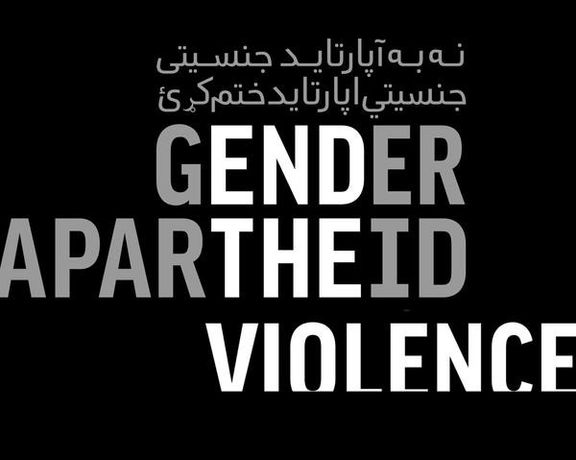
The signatories, which include opposition figures such as Iranian Nobel Peace Prize Laureate Shirin Ebadi and activist Masih Alinejad and Afghan activist Fawzia Koofi, said in their letter, "Looking at the example of condemnation of apartheid in South Africa by the international community, women living in Iran and Afghanistan are demanding similar responses to end these gender apartheid regimes."
They emphasized that the rights violations by the Islamic Republic and the Taliban are not limited to cases of gender discrimination, but these governments have waged a "more extreme, systematic and structural war" against women to suppress them. In addition to support from the international community, they want the world to criminalize “gender apartheid” in Iran and Afghanistan according to international conventions.
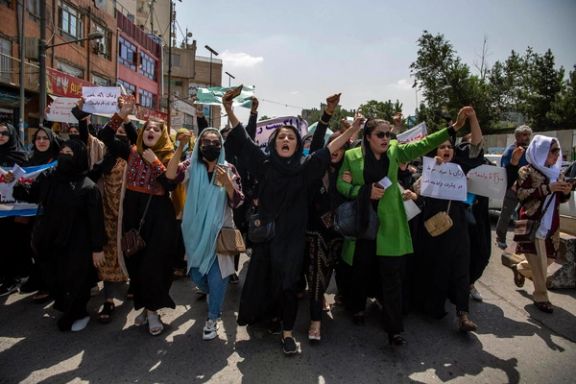
Foreign governments and officials have been vocal about the mass poisonings and other women’s rights violations by the Islamic Republic and Taliban. In a statement on International Women’s Day, US President Joe Biden said, “Despite decades of progress, in far too many places around the world, the rights of women and girls are still under attack, holding back entire communities. We see it in Afghanistan, where the Taliban bars women and girls from attending school and pursuing employment. We see it in Iran, where the regime is brutally repressing the voices of women who are courageously standing up for their freedom.”
The UK and the US, the European Union, and Australia issued sanctions on the Islamic Republic to mark International Women's Day. The UK targeted global violators of women’s human rights, including Iran's morality enforcing outfit and its top official, while the US imposed sanctions on Iranian officials and companies over serious human rights abuses.
Also on Wednesday, Member of the European Parliament Hannah Neumann said the Parliament will debate the poisoning of schoolgirls in Iran Wednesday next week, followed by a resolution, adding, “This provides another important opportunity to raise awareness about the repression in the country -- and the brave opposition to it.”
On Tuesday, 20 prominent Iranian lawyers and human rights advocates has issued a joint letter, calling on the WHO, the UNESCO, the UNICEF and the International Committee of the Red Cross to immediately visit Iran and probe into the serial poisoning of schoolgirls.